|
|
|
Sort Order |
|
|
|
Items / Page
|
|
|
|
|
|
|
| Srl | Item |
| 1 |
ID:
172050
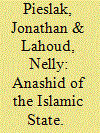

|
|
|
|
|
| Summary/Abstract |
This article examines the rise of the Islamic State (IS) through its anashid (a cappella), analyzing their lyrics and their musical attributes such as sonic elements, pitch, and harmony, among others. It focuses on key themes that define the group's lyrics and traces the evolution of anashid production and use—an evolution that began with the IS borrowing existing jihad-themed anashid to articulate its message and accompany its video messaging, and led to a far more developed and sophisticated sonic identity in the form of internally produced, group-specific anashid. The IS's claims to legitimacy as the caliphate are sounded out in the group's anashid. The recurring appearance of propaganda in the form of anashid and videos builds a strong case for the genre's significance among the highly complex factors catalyzing an individual's involvement in carrying out violence, especially among recent attacks within Western countries in the name of IS.
|
|
|
|
|
|
|
|
|
|
|
|
|
|
|
|
| 2 |
ID:
172053
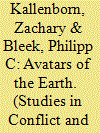

|
|
|
|
|
| Summary/Abstract |
Terrorists combining motivations and capabilities to conduct significant chemical, biological, radiological, or nuclear (CBRN) attacks are, logically and empirically, outliers. Certain characteristics of radical environmentalism heighten the risk of such outliers. The majority of even radical environmentalists embrace nonviolence. Those who turn violent mostly do so in limited ways due to a combination of motivations and capabilities. Fringe elements are motivated to commit large-scale—including CBRN—violence, but are mostly constrained by capability. Yet eco-radicalism also draws more capable adherents. If serious CBRN terrorism attacks occur—a risk about which analysts differ markedly—radical environmentalist fringe actors are plausible perpetrators.
|
|
|
|
|
|
|
|
|
|
|
|
|
|
|
|
| 3 |
ID:
172059


|
|
|
|
|
| Summary/Abstract |
Terrorism researchers have long sought to identify methods for challenging terrorist ideologies. The construction and dissemination of counternarratives has begun to receive substantial attention as a means of doing so. However, the effectiveness of this approach is contingent on message targets' trust in the counternarrative's content and source. This article draws from literatures on trust and online source credibility to offer preliminary guidelines for cultivating trust in counternarratives and their sources. By encouraging trust in this manner, practitioners can reduce the likelihood that their counternarratives will be dismissed by their intended audiences—a perpetual challenge to strategic messaging geared toward countering violent extremism.
|
|
|
|
|
|
|
|
|
|
|
|
|
|
|
|
| 4 |
ID:
172058
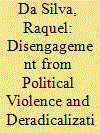

|
|
|
|
|
| Summary/Abstract |
This article applies a dialogical analysis to the change processes involved in moving from engagement with to disengagement from an armed militant group, as well as from radicalization to deradicalization. The findings underline the interplay between different push and pull factors at individual, organizational, and societal levels that played a role in the already mentioned processes in three periods of time—engagement with, life within, and disengagement from an armed organization. The dialogical framework conceptualizes the development trajectory as relationships between a variety of positions of the self (I-positions), which generate different personal meanings involved in processes of disengagement and deradicalization.
|
|
|
|
|
|
|
|
|
|
|
|
|
|
|
|
| 5 |
ID:
172052
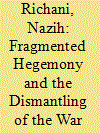

|
|
|
|
|
| Summary/Abstract |
Establishing peace in Colombia has been an enigma escaping the best intentions of some presidents. The causes of this riddle are multiple. Some attributed it to the nature of the state-making process led by a fractured elite compounded with the state limited resources in a country with one of the most complex topographies in the world. This article tackles part of this puzzle, particularly the inability of any fraction of the elite to establish its hegemonic vision over the others and hence to pacify the polity. It explores why previous presidents who attempted to find a peaceful settlement of its long armed conflict failed and why and how did President Juan Manuel Santos succeed. Against the backdrop of a fragmented hegemony, I analyze two core areas that have received scant attention in the literature, which are essential to understand the previous failures. The role of the United States in the Colombian conflict and the excessive autonomy of Colombia military institution vis-à-vis the executive in conducting the war.
|
|
|
|
|
|
|
|
|
|
|
|
|
|
|
|
| 6 |
ID:
172055
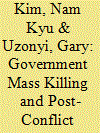

|
|
|
|
|
| Summary/Abstract |
Why do some countries implement trials to punish perpetrators of state-sponsored mass killing during civil war? A common explanation is that domestic and international demand for justice pressures the government to implement trials. However, this demand is unlikely to produce prosecutions because state-sponsored violence during fighting provides elites incentive to conceal information after war. The revelation of information concerning the government's atrocities could result in renewed domestic instability or international sanction. Therefore, a government that has committed atrocities during the civil war, and emerges victorious from the conflict, should be unlikely to pursue trials in the aftermath of the war.
|
|
|
|
|
|
|
|
|
|
|
|
|
|
|
|
| 7 |
ID:
172051


|
|
|
|
|
| Summary/Abstract |
This article presents new, original data on food riots and protests between 2005 and 2015 and explores the societal conditions in which these events occurred. These conditions include a range of economic, social, demographic, political, and household consumption factors, with reference to a number of conflict theories. The article explores whether instability related to food prices should be seen as an expression of hunger within the most vulnerable and deprived societies, or a demonstration of grievances rooted in broader political contestation. The article also contributes to debates about the methodological challenges of focusing on food prices as a factor relevant to instability and conflict, and the question of whether food riots have significance to broader debates about conflict.
|
|
|
|
|
|
|
|
|
|
|
|
|
|
|
|
| 8 |
ID:
172056
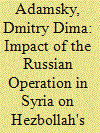

|
|
|
|
|
| Summary/Abstract |
This article hypothesizes about the impact that the Russian combat practice in Syria might have had on the operational art of Hezbollah. Three years of joint fighting with the Russian military has been a major formative experience for the organization. Presumably, this profound and diverse practice is likely to shape Hezbollah's subsequent military transformation, and to project on its force buildup tendencies, organizational structures and concept of operations. The article argues that Hezbollah's most profound takeaway from the Russian approach might relate to the notion of the reconnaissance-strike complex and its main segments—intelligence capabilities, command and control, and the element related to the actual use of force (Strike). Although this article aims to facilitate critical discussion about potential adaptations in Hezbollah's art of strategy and operations, its insights extend beyond the case itself, as they might be indicative of other hybrid nonstate actors in the Middle East and elsewhere.
|
|
|
|
|
|
|
|
|
|
|
|
|
|
|
|
| 9 |
ID:
172057


|
|
|
|
|
| Summary/Abstract |
This special issue is concerned with the development of the study of narratives of political violence and terrorism. While the concept of narrative has become increasingly popular among scholars in the field over the past two decades, this has not been accompanied by an active and critical engagement with its full ontological, epistemological, and methodological implications. This issue proposes to view the extant work through a basic framework of three modes of narrative—as lens, as data, and as tool—in order to take stock of the progress that has been made to date and to facilitate the identification of remaining research gaps. Building on this framework, the six contributions in this issue demonstrate how the study of narratives of political violence and terrorism may be advanced. This is done, in particular, through a focus on narrative's value for understanding social and political change, as well as an emphasis on developing interdisciplinary and methodologically innovative approaches.
|
|
|
|
|
|
|
|
|
|
|
|
|
|
|
|
| 10 |
ID:
172062
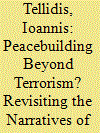

|
|
|
|
|
| Summary/Abstract |
Taking stock of critical peace research and agonistic politics, this article revisits the Basque conflict to examine the role of the state's counterterrorist narrative and that of the Basque civil society in the elimination of violence. It argues that violence could have ended sooner if Spanish governments had sought to engage with the non- and antiviolent independentist discourse of broad sectors of the Basque society, rather than criminalizing it as they rightly did with the radical/extremist nationalists. Had they done so, they could have capitalized on Basque civil society's strong antiviolent and anti–Euskadi Ta Askatasuna discourse to marginalize the terrorist organization and its networks of support. The article presents a framework that makes possible the marginalization of militancy and extremism in cases where the state accepts to negotiate the legitimacy of the demands of non- and/or antiviolent nationalists.
|
|
|
|
|
|
|
|
|
|
|
|
|
|
|
|
| 11 |
ID:
172063


|
|
|
|
|
| Summary/Abstract |
Adopting an ethical approach to education that focuses on the perspective of victims, this article analyzes some of the difficulties of acknowledging the victims of political violence in the Basque Country. It conceptualizes these difficulties as pathologies of recognition and argues that works of literary fiction have humanizing and educational value insofar as they reflect the victim's perspective and foster the reader's ethical education through narrative imagination. As a critical example, the article provides an analysis of four Basque literary works of fiction that respond to the pathologies of recognition as they narrate various acts of victimization. The transformative potential of working with literature that tells stories of victimization for politically violent conflicts in the Basque Country and elsewhere is highlighted.
|
|
|
|
|
|
|
|
|
|
|
|
|
|
|
|
| 12 |
ID:
172049


|
|
|
|
|
| Summary/Abstract |
While the Night Wolves Motorcycle Club's (NWMC) roots are similar to Western counterparts such as the Hells Angels MC and Bandidos MC, they have evolved into a proxy of the Russian state who unite combat-ready diasporas. The NWMC nongovernmental organization provides soft propaganda while they operate alongside the Russian military and imbed military tactics into foreign Russian populations through their corporate entity Wolf Holding of Security Structures. This case study explores the evolution from outlaw motorcycle club to political force and their integration into Russia's information operations and conflict. The NWMC activities in Eastern Europe, particularly Ukraine, highlight how this motorcycle club has been able to cultivate a fifth column to agitate domestic politics and increase ties to the Kremlin.
|
|
|
|
|
|
|
|
|
|
|
|
|
|
|
|
| 13 |
ID:
172054


|
|
|
|
|
| Summary/Abstract |
This study analyzes the demographics, criminality, and network relations of forty-one deceased Swedish foreign fighters. Our results show that most of the deceased Swedish foreign fighters were on average just under 26 years old when they died. Concerning network relations, nineteen out of the forty-one foreign fighters had at least one relationship (next-of-kin or friend) with another deceased foreign fighter. Two thirds were previously suspected of at least one crime. Based on our results, we argue that more attention needs to be given to tertiary and secondary prevention directed toward foreign fighter hubs.
|
|
|
|
|
|
|
|
|
|
|
|
|
|
|
|
| 14 |
ID:
172061


|
|
|
|
|
| Summary/Abstract |
The German media have played a much more important role in the context of the National Socialist Underground (NSU) than has been acknowledged. Drawing on criminological approaches to media images of crime and narrative hermeneutics, this article is based on an analysis of more than 1,000 print news articles published on the NSU crimes before and after the discovery of the perpetrators in November 2011. It argues that the story of the NSU as a right-wing terrorist group whose violent campaign was not recognized for more than a decade cannot be conceived of without the news media's narrative work across the period 2000–2012.
|
|
|
|
|
|
|
|
|
|
|
|
|
|
|
|
| 15 |
ID:
172060
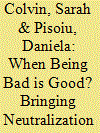

|
|
|
|
|
| Summary/Abstract |
Bringing together terrorism studies, subcultural theory, and narrative criminology, we here test the thesis that neutralization theory might be (further) developed to provide a framework for understanding stories of ideologically informed subcultural violence. Beginning with Gresham Sykes's and David Matza's original five neutralizations, we illustrate how actors engage them in three modes: the encultured, the subcultural, and (tentatively) the postnarrative mode. We test the first two modes in particular against narratives and narrative fragments from interviews with men convicted of right-wing violence in Germany. Our findings provide a preliminary illustration of what neutralization theory might bring to research into political violence.
|
|
|
|
|
|
|
|
|
|
|
|
|
|
|
|
|
|
|
|
|